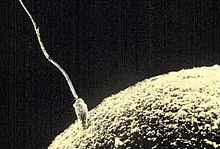
Controversy over the beginning of pregnancy occurs in different contexts, particularly as it is discussed within the debate of abortion in the United States. Because an abortion is defined as ending an established pregnancy, rather than as destroying a fertilized egg, depending on when pregnancy is considered to begin, some methods of birth control as well as some methods of infertility treatment might be classified as causing abortions.
The controversy is not primarily a scientific issue, since knowledge of human reproduction and development has become very refined; the linguistic questions remain debated for other reasons. The issue poses larger social, legal, medical, religious, philosophical, and political ramifications because some people, such as Concerned Women for America, identify the beginning of a pregnancy as the beginning of an individual human being's life.[1] Many of these arguments are related to the anti-abortion movement. In this way of thinking, if the pregnancy has not yet begun, then stopping the process is not abortion and therefore can contain none of the moral issues associated with abortion, but if it is a pregnancy, then stopping it is a morally significant act.
A major complication is that ideological and religious concepts such as "ensoulment" (whether or not a human being is said to have gone from mere matter to having a spiritual entity inside) and "personhood" (whether or not a human being is said to be a distinct individual with innate human rights versus otherwise) exist outside of scientific analysis, and thus many individuals have argued that the beginning of pregnancy cannot be determined strictly through physical evidence alone. No experiment exists (or can exist) to measure the spirituality of an object or living thing in the same way that height, temperature, weight, etc. can be studied.
Generally speaking, some ideological and religious commentaries have argued that pregnancy should be stated as beginning at the first, exact moment of conception in which a human sperm makes full contact with an egg cell. In contrast, other commentaries have argued that the duration of pregnancy begins at some other point, such as when the fertilization process ends (when a new, independent cell genetically distinct from the prior egg and sperm exists) or when implantation occurs (when the new set of cells lodges itself against the uterine wall, allowing it to grow rapidly). The ambiguity's implications mean that, despite the scientific community being able to describe the physical processes in detail, the decision about what should be called "abortion" and what should be called "contraception" or pregnancy prevention are not agreed upon.[1]
- ^ a b c "The Implications of Defining When a Woman Is Pregnant". The Guttmacher Report on Public Policy. May 2005, Volume 8, Number 2.
